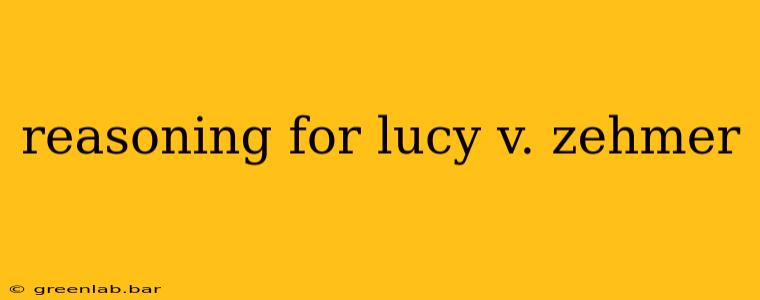Lucy v. Zehmer, a 1954 Virginia Supreme Court of Appeals case, remains a cornerstone of contract law, particularly concerning the crucial element of intent. This seemingly simple case, involving the sale of a farm scribbled on a napkin, offers profound insights into how courts interpret the formation of contracts. Understanding the reasoning behind the court's decision requires examining the key facts and the legal principles applied.
The Facts of the Case: A Farm, a Napkin, and a Dispute
The case centers around a contentious transaction between Lucy and Zehmer. Over drinks, Lucy persistently pressed Zehmer to sell his farm. Zehmer, initially resistant, eventually wrote on a bar napkin an agreement to sell the farm for $50,000. He and his wife both signed the document. However, Zehmer later claimed the entire affair was a joke, asserting he never intended to sell his property. Lucy, believing the contract to be genuine, sought specific performance—a court order compelling Zehmer to fulfill the agreement.
The Court's Reasoning: Objective Intent Trumps Subjective Intent
The crux of the court's decision hinges on the concept of objective intent. While Zehmer's subjective intent was to joke, the court focused on his objective actions and manifestations. Several factors contributed to the court's finding that a valid contract existed:
1. The Serious Nature of the Negotiations:
The court noted the protracted nature of the negotiations, spanning hours and involving several revisions to the terms on the napkin. This demonstrated a seriousness inconsistent with a mere jest. The extensive back-and-forth discussion belied any claim of casual or joking intent.
2. The Written Agreement and Signatures:
The existence of a written agreement, albeit on a napkin, and the signatures of both Zehmer and his wife carried significant weight. This tangible evidence underscored the apparent seriousness of the agreement, despite Zehmer's later claims to the contrary. The formality, even in its simplicity, proved persuasive to the court.
3. Lucy's Reasonable Belief:
The court acknowledged Lucy's reasonable belief that Zehmer intended to enter into a binding contract. Given the circumstances, including the extended negotiations and the written agreement, it was reasonable for Lucy to conclude that Zehmer was acting in good faith. The court considered Lucy's perspective, recognizing the importance of protecting those who reasonably rely on the outward manifestations of another's intent.
4. Zehmer's Apparent Capacity:
While intoxication was raised as a defense, the court found Zehmer sufficiently lucid to understand the nature of the transaction. This demonstrated his capacity to enter into a contract, undermining his claim that the agreement was a mere joke, not a legally binding contract.
The Significance of Lucy v. Zehmer: Impact on Contract Law
The Lucy v. Zehmer case serves as a vital precedent, solidifying the importance of objective intent in contract formation. It clarifies that a party's internal, subjective intent is irrelevant if their outward actions and words reasonably indicate an intent to be bound. The case emphasizes the need to consider the totality of the circumstances when evaluating the existence of a contract, rather than relying solely on one party's post-hoc assertions.
This decision has far-reaching implications, influencing how courts approach contract disputes. It stresses the significance of clear communication, the weight of written agreements, and the reasonableness of reliance on apparent intent. The case acts as a cautionary tale, reminding parties to be mindful of their actions and words when engaged in contractual negotiations, regardless of the context. The seemingly simple scenario underscores the complexity and subtleties of contract law.
Disclaimer: This article provides a legal analysis for educational purposes only and is not intended as legal advice. Consult with a legal professional for advice related to specific legal matters.

